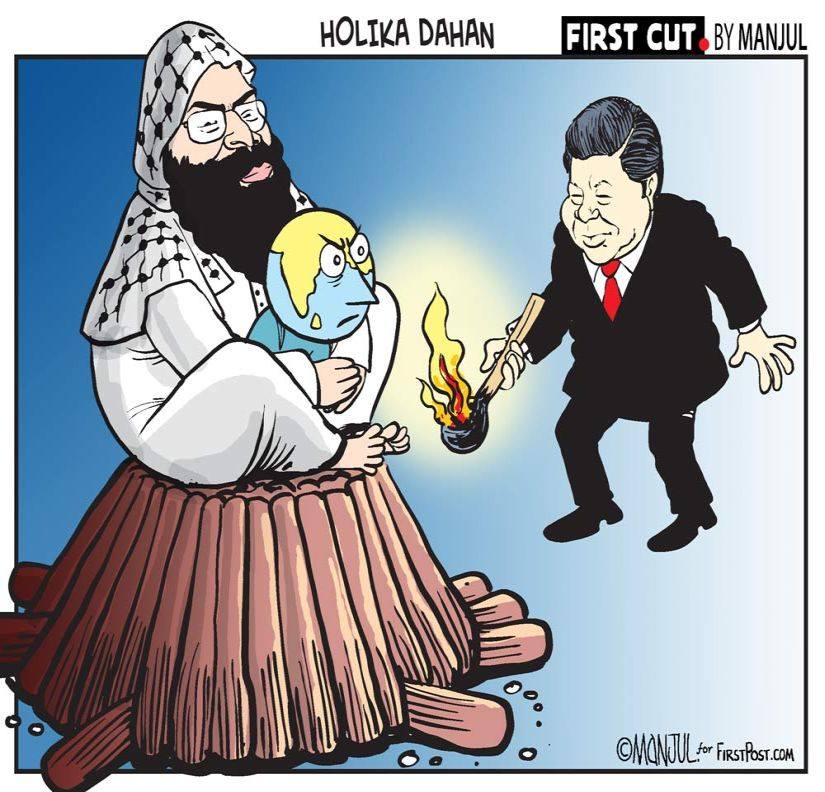The not entirely unexpected happened when China recently decided to again block the designation of Jaish-e-Mohammed chief Masood Azhar as a global terrorist by the United Nations Security Council. Not entirely unexpected because for a while, it seemed that Beijing may relent, especially since it chose to strongly condemn the Pulwama attack, even while being relatively milder in response to an equally violent attack on the Iranian Revolutionary Guards a day earlier. A change in stance was also expected following the
“Dawn Leaks” episode – a real news breaker by Pakistani journalist Cyril Almeida – which had suggested that the repeated blocking of Azhar’s designation was causing Beijing some discomfort. In the event, Beijing did not withdraw its ‘technical hold’ on the designation, despite reported pressure from the US, UK and France, who actually moved the resolution in the Security Council. The move to table a resolution would have been prompted by New Delhi, with some expectation of success. After all, External Affairs Minister Sushma Swaraj had briefed Chinese foreign minister Wang Yi on the Pulwama attacks just a few weeks earlier during the RIC (Russia India China) dialogue. After that, a rather heartening joint communiqué which said that “those committing, orchestrating, inciting or supporting terrorist acts must be held accountable and brought to justice in accordance with existing international commitments on countering terrorism” made Delhi hopeful. But the communiqué notwithstanding, the Foreign Ministry spokesman’s statements had been obliquely critical of the Indian air trikes. [caption id=“attachment_2597982” align=“alignleft” width=“380”] File image of JeM chief Masood Azhar. Reuters[/caption] After the usual language calling for restraint,
the spokesman added, “Fighting terrorism is a global practice. It needs necessary international cooperation. And India needs to create favourable condition internationally for the same”. Clearly, India’s efforts to get the issue of a terrorist to the United Nations was not seen as part of creating such “favourable conditions”. That Beijing was alarmed was obvious. After an urgent phone call from Pakistan’s foreign minister Qureshi, China sent vice-foreign minister Kong Xuanyou to Pakistan, where he seems to have met with the top brass of the army and the prime minister, among others. The Chinese foreign ministry
spokesman’s briefing after the visit should have been indication enough on China’s stance. It specifically indicated that Kong had praised the ‘all weather’ friendship, praised Pakistan’s counter-terrorism efforts and overall, was unabashedly in Pakistan’s favour. In such a situation, it seems that New Delhi should have withdrawn the resolution at the Security Council. If it did not, clearly it had its own reasons. First, by withholding the designation, China has shown itself as an arbiter for a country who has been called out as a sponsor of terrorism by three countries in just a week. India, Iran and Afghanistan have all come out strongly for action against Pakistan, after each suffered severe terrorist attacks. Second, this continued blocking of Azhar puts a strain on Sino-Pakistan ties. Beijing is the last one to do favours for anyone for sentimental reasons, the flowery language of a friendship “deeper than the seas” notwithstanding. Some quid pro quo from Pakistan would be certain. There is a third reason that is interesting. Pakistan’s intelligence channels go deep into Afghanistan, Iran, and other neighbouring countries. Note that a British delegation was holding workshops with Pakistan’s NACTA (National Counter Terrorism Agency) on 10 March, despite the calling out of Pakistan as sponsor of terrorism and London’s backing of a Security Council resolution at the same time period. Pakistan’s patronage of terrorist groups of all kinds gives it a certain macabre leverage. This has been part of Pak-British ties for years. It could also be part of the Beijing relationship at a time when resistance to China is on the rise in the restive province of Xinjiang. [caption id=“attachment_6299331” align=“alignnone” width=“825”]
 Cartoon by Manjul.[/caption] The question is therefore whether India should have expended so much diplomatic capital on the Azhar designation issue, especially when it seemed a foregone and negative conclusion. After all, the JeM is a UN designated terrorist group, and it seems infructuous to also add its leader to a listing, which for all practical purposes has no real meaning. A listing under UNSC Resolution 1267 would have involved an assets freeze, a travel ban and an arms embargo. Azhar has no property outside Pakistan that can be sealed, nor is he likely to travel abroad frequently for a travel ban to be instituted. As for arms, there are several hundreds available within Pakistan and also in his own arsenal. It could be argued that the terrorist designation of Hafiz Saeed hasn’t really hampered his activities very much, though a certain restriction is evident. But the point of the whole exercise is that a constant barrage of negative publicity will further weaken Pakistan’s already damaged reputation, which in turn may adversely affect its tottering economy. Neither international investors, banks nor institutions will want to invest or otherwise provide assistance to a country that harbours terrorists. That is at the core of the “isolation” that Prime Minister Modi and the Indian Foreign Office are aiming for in their Pakistan policy. China has bailed out Pakistan this time around, but this is likely to get diplomatically more expensive for Beijing and Pakistan as time goes on, and terrorists continue to operate. It could also get financially more expensive. Chinese companies like their counterparts elsewhere will want security guarantees for their investment. A country that is at the centre of a threatened war is hardly the best investment destination for any company that cares for its balance sheets. In the end, the designation exercise places a dollar value on the whole Sino-Pakistan relationship, and its viability.
The not entirely unexpected happened when China decided to again block the designation of Jaish-e-Mohammed chief Masood Azhar as a global terrorist.
Advertisement
End of Article


)

)
)
)
)
)
)
)
)



